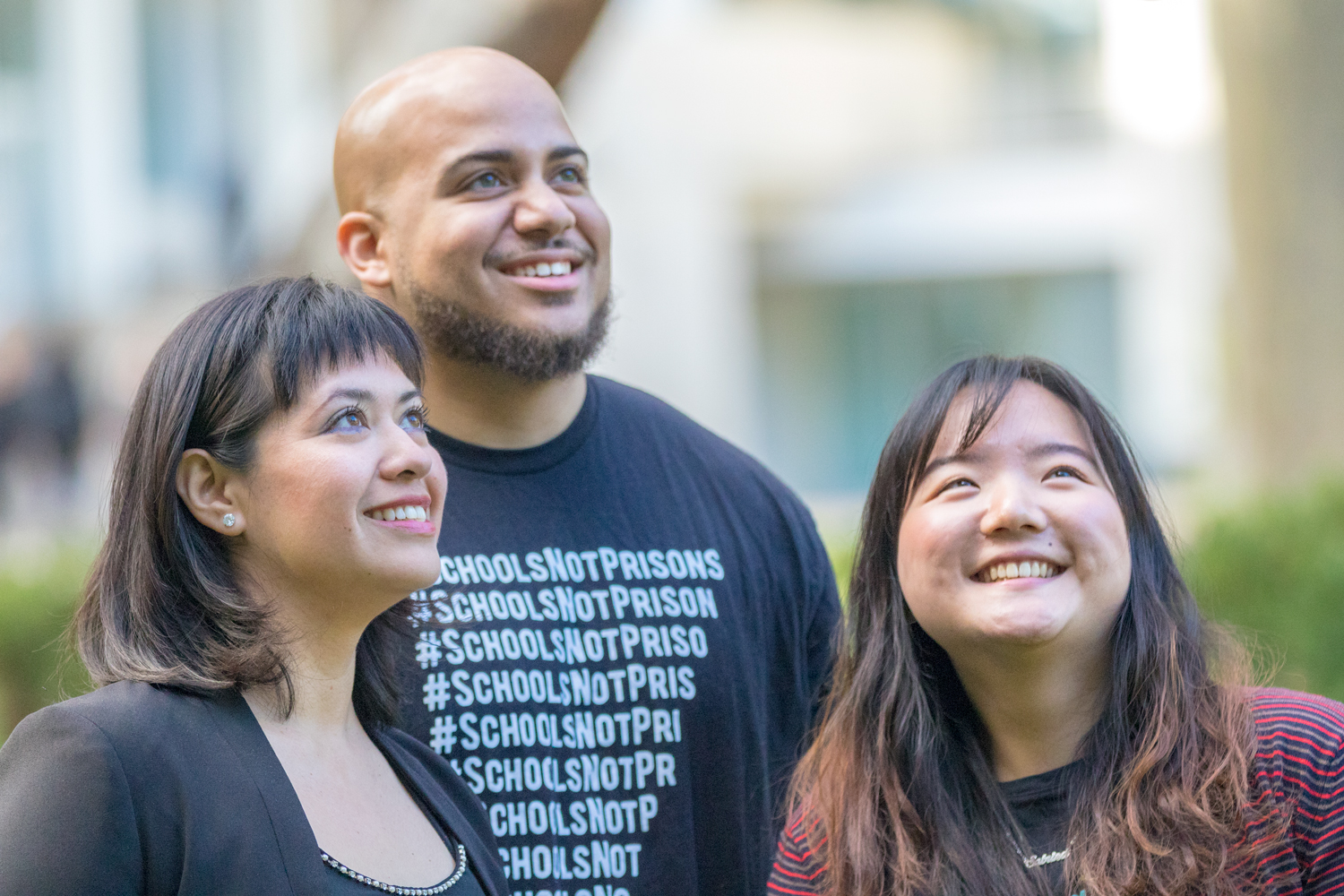From left, Marisol Granillo Arce, Isaac Bryan and Sabrina Kim. Photo by Les Dunseith
Three in the Class of 2018 who are already changing the landscape of public affairs
By George Foulsham
The UCLA Luskin School of Public Affairs takes pride in producing change agents — alumni who, in the words of Dean Gary Segura, go out into the world as leaders to effect change as practitioners, researchers and policymakers.
But did you know that UCLA Luskin students are already doing those very things as part of their graduate education? Students from all three of the School’s departments — Public Policy, Social Welfare and Urban Planning — work in boots-on-the-ground jobs that impact the lives of thousands in Southern California and beyond every day.
We followed three of those students during the 2017-18 academic year as they pursued MSW, MPP and MURP degrees. All three went on to graduate this year, and all three have hopes and dreams of what they might be able to accomplish as future leaders in their respective fields. These are their stories of adversity and accomplishment.
AN IMMIGRANT WHO BECAME AN ADVOCATE
Marisol Granillo Arce MSW
The mood is upbeat and supportive at the Garment Worker Center in downtown Los Angeles on a sunny January afternoon. Inside, more than a dozen women have gathered to hear a presentation about sexual harassment and assault in the workplace — a not uncommon problem in the Garment District.
Marisol Granillo Arce, a Social Welfare student at UCLA Luskin, is about five minutes into her speech when one of the women starts to sob. Granillo Arce and her colleagues rushed to the woman’s side to console her and listen to her story of having been assaulted while on the job.
This is just one of many assignments Granillo Arce is tackling this year as she puts herself through UCLA. She’s an undocumented immigrant, alone in Southern California. Her family lives in Mexico and she hasn’t seen them for more than two years. Still, she persists.
“It was challenging,” she says of her childhood, during which she bounced back and forth from Mexico to the U.S. “I went through some very difficult situations … but I think that some of those challenges have helped me be the individual that I am today.”
Whether it’s sexual, physical, verbal or emotional abuse, Granillo Arce has seen it all in her upbringing and education, and it’s a powerful motivator.
“The experiences I overcame in my childhood and as an undocumented immigrant have inspired me to play an active role in my community — whether it’s through advocacy, case management or mental health awareness,” she says. “I know firsthand what it feels like to go through depression, anxiety or neglect. I want to be able to guide people through the process so they know how to access resources.”
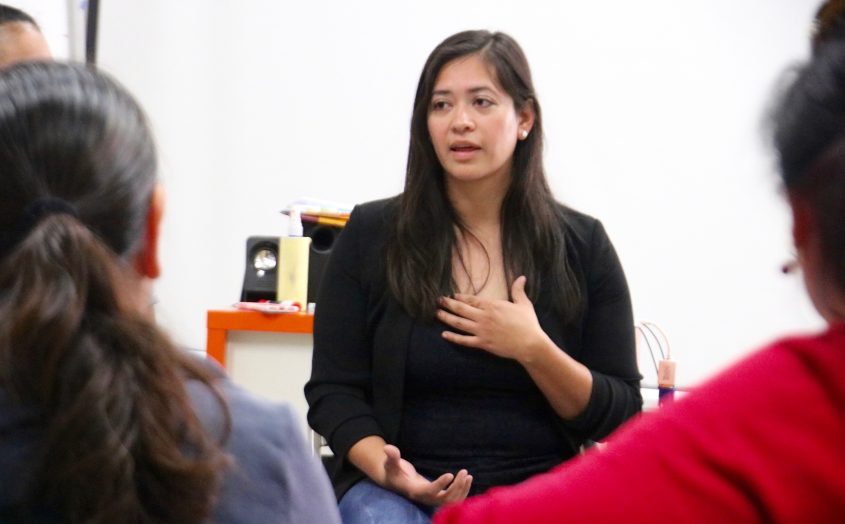
Marisol Granillo Arce speaks to a group of women gathered to hear a presentation about sexual harassment in the workplace. Photo by George Foulsham
One Student, Many Roles
As she finishes her master’s degree, Granillo Arce is working as a graduate student researcher for the UCLA Downtown Labor Center, part of the Institute for Research on Labor and Employment — a multidisciplinary center dedicated to research, teaching and service on labor and employment issues.
For the past two years, Granillo Arce has been part of a project that focuses on improving educational opportunities for janitors’ families and their communities. She has helped train a cohort of janitor parents and union members to become advocates for their children’s education.
Her latest assignment is in the Garment Worker Center and with domestic workers who are members of Mujeres en Accion (Women in Action).
“Through this project, I have been having the opportunity to connect, listen to and inform parents about how to navigate not just the educational system, but also how to access free community resources available despite immigration status,” Granillo Arce says. “It’s bridging academia with the labor movement.”
She also supervises and supports other UCLA students, assisting them as they tutor the children of the labor movement workers.
“Tutoring is just a small portion of the bigger project — training the parents so they can become not just advocates for their children’s education, but also to learn how to access community resources, such as museums, parks, libraries and other things,” she says.
Granillo Arce is also a social welfare intern at Eisner Health Center in downtown L.A. There, she works with Spanish-speaking adults and parents in the adult and pediatric department where she conducts a brief functional assessment and implements behavioral activation techniques for symptom reduction.
After an evaluation, she refers patients to mental health services or connects them with case management. “Sometimes they have sleep problems because they’re worried too much about their finances, or they’ve just lost their job,” she says.

Marisol Granillo Arce was one of the featured speakers at this year’s Social Welfare Welcome Day. Photo by George Foulsham
A DACA Pioneer
Granillo Arce is more than an undocumented immigrant; she’s a pioneer of DACA, the Deferred Action for Childhood Arrivals immigration policy.
“I’m proud to say that I got involved when the whole movement started around DACA,” she says. “The campaign was originally called the Right to Dream campaign, but because we didn’t get a lot of momentum from policymakers and the White House, we switched the name of the campaign.”
Granillo Arce did a lot of advocacy in the community, including taking to the streets for protests, to push for a more comprehensive immigration policy, not just for students but for the larger immigrant community.
“Unfortunately, we had to compromise, and we got DACA,” she says. “It’s not what we were asking for, but it was a temporary alleviation to many years of not having anything for some of us.”
Her other jobs since earning her bachelor’s degree at Cal State L.A. in 2009 have been “under-the-table” work as a nanny, house cleaner and at a restaurant in Brentwood.
It hasn’t been easy being undocumented in this country. DACA recipients have become a bargaining chip for politicians who use them in contentious budget negotiations.
“It’s heartbreaking to have to wake up every day in a country where you are doing the best you can, whether it’s working or going to school,” Granillo Arce says. “It’s hard that at the end of the day as professionals with degrees … you’re told that you cannot work in your field because you are required to have a Social Security number.”
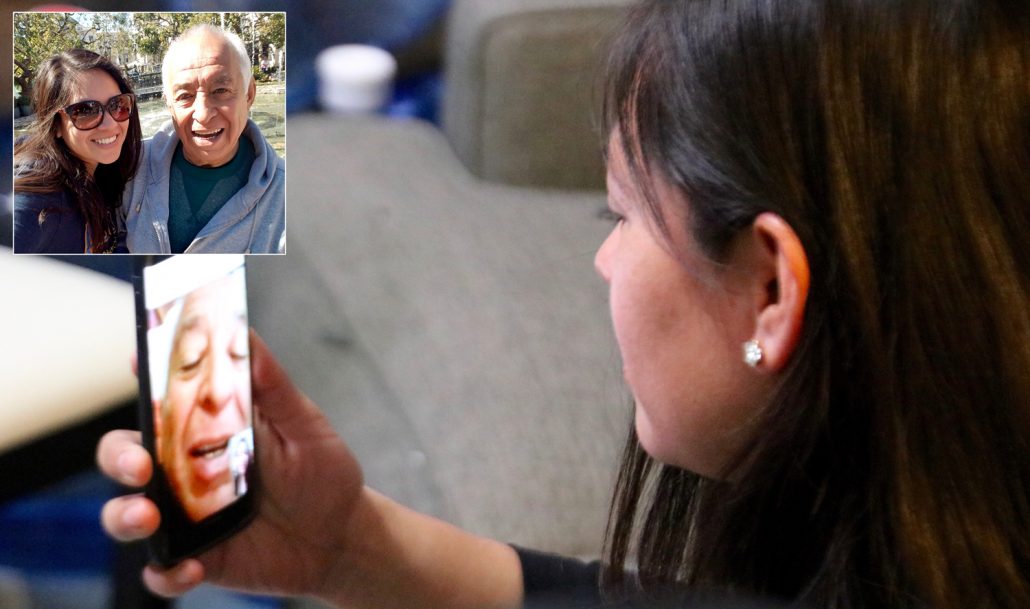
Marisol Granillo Arce hasn’t seen her family in Mexico for more than two years, so she communicates with her father, inset, using a chat program on her cellphone. Photo by George Foulsham
A Love for Luskin
Granillo Arce has high praise for the UCLA Luskin School of Public Affairs.
“Luskin School has meant a lot to me in the past two years,” she says. “Although it has been challenging financially, Luskin has given me the tools I need not only to take my career to the next level, but also to make a difference in communities with little resources. Faculty — everyone — is just supportive and open and available for you if you really need it. Even the dean,” she adds with a smile.
In her second year as a graduate student, Granillo Arce has taken on leading roles at UCLA’s Volunteer Day, immigration forums on campus and Social Welfare’s Welcome Day for next year’s incoming students.
After graduating in June, Granillo Arce will pursue a Master of Public Health in Community Health Sciences at the UCLA Fielding School of Public Health in the fall. Her ultimate goal is to “transcend socioeconomic barriers and empower immigrant communities by promoting health, building communities, sharing culture and bringing more mental health awareness.”
However, she knows that her first post-graduation job might not be here, or elsewhere in the U.S. “I’m on the more privileged side with my education and all this knowledge that I have,” Granillo Arce says. “And I know for some other individuals, that’s not the case to be able to go back to their country because there’s a fear of being killed. For me, if it means I need to relocate to some other country, I think that for me, that’s an option.”
◊
AN AIMLESS YOUTH WHO TURNED IT ALL AROUND
Isaac Bryan MPP
Success hasn’t always been easy for Isaac Bryan.
When he graduates in June with a Master’s degree in Public Policy, it will mark the next step in a 26-year, courageous struggle to prove that he belongs in a world that once seemed determined to knock him down.
Bryan’s Instagram post on March 24, 2018, sums it up pretty well:
“I wasn’t allowed to graduate in middle school because my grades were so bad. My language arts teacher said I was headed straight for hopelessness. Today I was published in a top academic journal on criminology.”
Having a study published by Crime & Delinquency is just the tip of the success iceberg for Bryan. In no particular order, he has presented this academic year at the U.S. Conference of Mayors in Washington, at the Capitol in Sacramento, at the ACLU of Southern California, at Columbia University in New York and at UCLA as one of a select group of 11 graduate student finalists in the Grad Slam research competition. (He finished second.) Oh, and he was one of the presenters at the TEDxUCLA event in Royce Hall in April, where he received a standing ovation.
That’s literally thousands of miles from the instability of the first 18 years of Bryan’s life. He’s lived in Florida, Texas, Utah and California. He’s attended 11 public schools, including three California high schools.
“Nowhere really felt, or feels, like home when I go back,” he said in a recent interview at L.A. City Hall, where he’s working as a David Bohnett Foundation Fellow in the office of Mayor Eric Garcetti. “After my first quarter at Luskin, I knew I had found a home. I realized that there was opportunity, opportunity to research, opportunity to develop relationships, opportunity to develop mentors and guidance.”
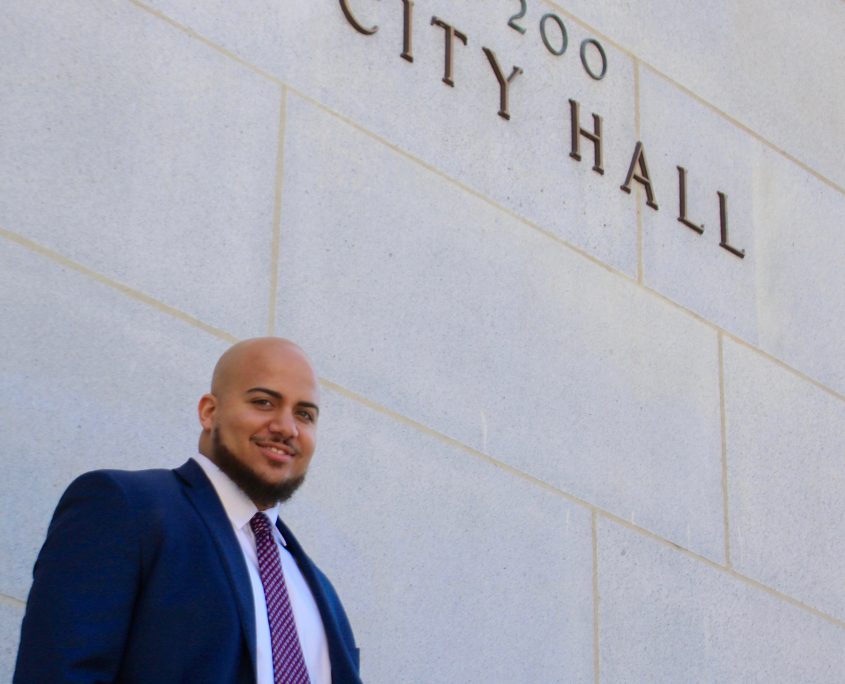
Isaac Bryan at Los Angeles City Hall, where he has worked for the past year. Photo by George Foulsham
Poise and Purpose
How he got to UCLA Luskin Public Policy is a story of poise and firmness of purpose.
“Growing up, I never believed that this was possible,” Bryan says. “But about a year ago, you couldn’t have told me that this wasn’t possible. And I’m grateful to be here.”
Bryan says that he and eight of his siblings represent “America’s blind spots — all victims of the child welfare system, to different degrees and different ways.” The family circumstances led to him being adopted, which provided a lens for how good governance and research can shape social dynamics.
He grew up in Moreno Valley, California, where, he says, “you weren’t prepared for a four-year education. You were prepared for the local community college.”
His only plan then was to survive. He lost friends to gang violence. “Thinking about coming to a space like this, like City Hall, like UCLA, and impacting real change, those weren’t the things that we thought about,” he says. “Those weren’t the things we believed we could do.”
Even when he went off to University of Arizona for his undergraduate studies, he couldn’t have predicted that he would wind up in graduate school at UCLA. About five years ago, Bryan was a floor manager at a California Pizza Kitchen in Arizona.
“I would bring you your iced tea and check on your experience dining with us,” he says. “I was very good at that. There was a point in my life where I thought that’s what I was going to do.”
His life pivoted when he was passed over for a salary increase. “That’s when I got heavily invested in my studies,” he says. “The next semester at Arizona I took a 19-unit course load, just to push and prove that I could be more. And it was the best semester I ever had academically. It was at that point that I started to believe it was possible.”
The combination of a difficult childhood and his research at Arizona led Bryan down the path that brought him to UCLA Luskin.
“When you’ve been through the child welfare system, seen it up close, or you’ve been let down by other systems … there are some challenges that are hard to overcome,” he says. “For a lot of my older siblings, I saw things like the juvenile justice system, the criminal justice system, homelessness. These weren’t just areas of research, these weren’t policy priorities. These were real things that real members of my family were going through and are still going through.”
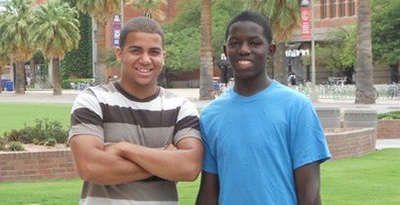
Isaac Bryan said his younger brother struggled to find his way after Isaac went off to college.
His Brother’s Helper
One of his brothers struggled to find his place in life after Bryan went off to pursue his studies in Arizona.
“My little brother’s place in the family became unstable with me going to college,” he says. “I felt like those were interrelated because I couldn’t be there to guide him, to show him how to grow up to be a black professional, a black scholar, to take pride in yourself and the community and the responsibility you have to make the most of your opportunities.”
Pushed out of the family home, his brother wound up homeless and a ward of the California courts.
“He was homeless in San Diego, with no resources, and nobody around,” Bryan says. “And one thing I learned very quickly studying criminal justice literature is that once you become homeless, or have housing instability, your likelihood of encountering law enforcement and subsequently being incarcerated increases astronomically. So I knew it was just a matter of time.”
Bryan’s brother cycled through jails for low-level petty theft and substance abuse violations. In his early 20s, he wound up in state prison.
“He’s been in an out of incarceration the entire time I’ve been getting my undergraduate and graduate education,” Bryan says. “That has indelibly left a mark on me and the importance I place on the work that I do.”
It’s no surprise then that criminal justice has been the focus of his research.
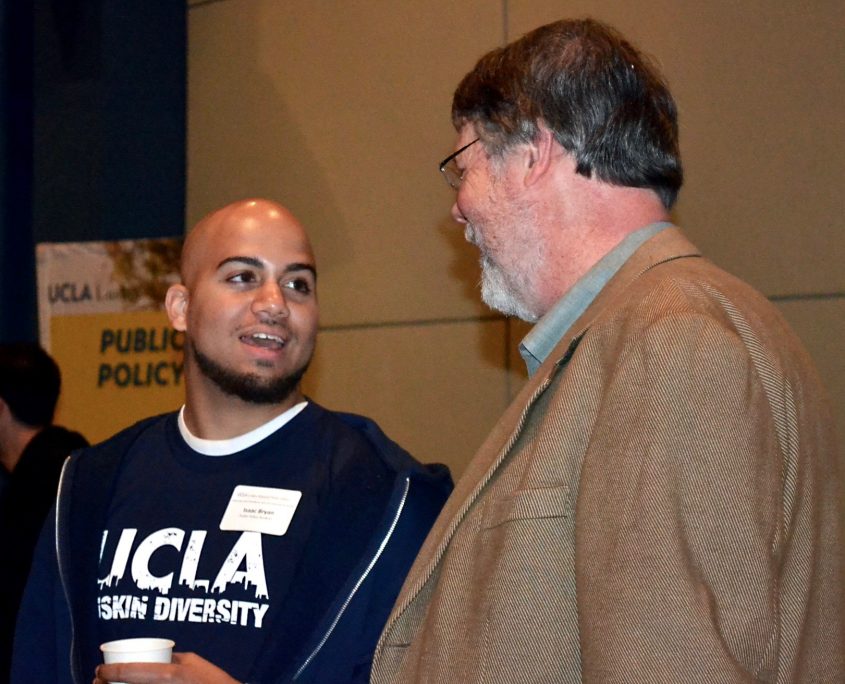
Isaac Bryan speaks with Mark Peterson, professor of public policy at UCLA Luskin. Photo by Stan Paul
Missions Accomplished
Since joining UCLA Luskin as a Public Policy student, Bryan has:
- Worked with Laura Abrams, the chair of UCLA Luskin Social Welfare, to produce a policy brief and subsequent academic articles outlining why California should have a minimum age of juvenile jurisdiction. Their research spurred State Sen. Holly Mitchell to introduce SB-439, which would modify the ages that a person must be to fall within the jurisdiction of the juvenile court or adjudged a ward of the court to be between 12 and 17 years of age.
- Led an effort for bail reform in Los Angeles. “I was able to quantify how much bail was levied in the City of Los Angeles,” Bryan says. “That sum was $19 billion over a five-year span. That was eye-popping to me, and it was even more eye-popping to policymakers.” The study highlighted the disparity in the bail process for the rich vs. the poor.
- Helped to author a report while working in the mayor’s Office of Re-Entry to address the holistic needs of prisoners when they re-enter society. Working with colleagues at UCLA Luskin, Bryan mapped the re-entry population to calculate how many people were returning to Los Angeles after prison, where they’re going and what kind of services they need. “I’m becoming more confident that upon my brother’s release — and for a lot of Angelenos — that there are systems being put in place and a framework that’s being established to help ease that and curb recidivism both here and statewide,” Bryan says.
- Partnered with UCLA history and African American Studies Professor Kelly Lytle Hernandez in the Million Dollar Hoods research project to study re-entry populations, homelessness, bail reform and cannabis enforcement in Los Angeles. The project relied on law enforcement data compiled over the past eight years. “Million Dollar Hoods is an amazing project on the UCLA campus,” Bryan says, crediting the mentorship he received from Hernandez.
- Identified five new ways to deploy interventions and strategies to help address street-level homelessness after shifting to the mayor’s CENTCOM team in 2018.
Bonus video: Why he chose UCLA Luskin
Los Angeles, Bryan says, is the city for innovation, the city for trying new things. And, once he finished his bachelor’s degree at the University of Arizona, Bryan says that “there was only one school that I wanted to go to, and that was UCLA Luskin.”
Based on all that he’s accomplished in less than two years, that has turned out to be great decision, for UCLA, Bryan and the residents of Los Angeles.
“There’s just something about studying policy at UCLA,” he says. “It’s hard to describe. You know that what you’re doing is the highest level. I thought I was coming for a graduate degree, and what I ended up receiving is an experience that will forever shape the way I impact, influence and evaluate policy.”
◊
A WORLD TRAVELER WHO STUDIES CITIES
Sabrina Kim MURP
On a cloudy March afternoon, Sabrina Kim and about 30 of her fellow UCLA Luskin Urban Planning students gather in the council chambers of Hawthorne City Hall, preparing for presentations to members of the Hawthorne Planning Commission.
Downtown Hawthorne isn’t what it used to be. An abandoned shopping mall, shuttered in 1999, occupies several square blocks of what was once a vibrant urban center, and the commissioners are wrestling with what can be done to transform this valuable real estate — the heart of their city.
“Hi, I’m Sabrina Kim, and I’d like to introduce you to my fellow students. We are honored to be here today to show you what we’re proposing for your city …”
For the next 10 minutes, Kim and four other students present options for a new Hawthorne — a chance for economic growth, capitalizing on Elon Musk’s SpaceX headquarters, a Tesla assembly plant, an adjoining Green Line Station and the nearby Hawthorne Airport.
As part of Urban Planning lecturer Gaurav Srivastava’s studio class on transportation and land use, the students have been split into groups, and they’ve spent the winter quarter preparing plans for Hawthorne city leaders to consider.
This experience in a Southern California city hall is but one example of how Kim has devoted time and studies in her final year at UCLA Luskin to addressing the needs of Southern California cities and residents.
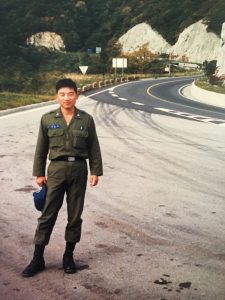
Sabrina Kim’s father as a young soldier in South Korea.
A Tale of Two Koreas
Kim Nam Hyun was born in Seoul, South Korea. She lived there until she was 12, then moved to Canada to live with her aunts for more than two and a half years before returning to South Korea — the same country that’s been in the news for much of the past year because of political turmoil between the North, South and the U.S.
Her grandmother’s siblings remained in North Korea, though she has never met them and doesn’t know if they’re still alive.
“I have always considered North Korea part of one country, but I think now with all the situation going on … more and more people are thinking of us as two different countries,” Kim says. “It’s interesting because my sister is eight years younger than me, and she thinks of North Korea as just another country. Whereas, when I went to elementary school in Korea, we used to be taught that we’re just one country, but we’re divided by the political situation.”
Kim moved to Canada because her parents wanted her to improve her English and her doctor thought it would be better for her asthma. After returning to Korea she enrolled in an arts high school in Seoul. “I so love art and I sometimes paint or draw,” she says. “But I could see that it will be really difficult for me to make a living by just doing art.”
She then attended a private research institution in South Korea, Hongik University, to study engineering. “It’s important to note that urban planning is part of the engineering school in Korea and when you’re looking for a job, having an engineering degree is a big plus,” Kim says.
Kim then cast a wide net for graduate schools in the U.S. Her faculty adviser at Hanyang received his Ph.D. at Berkeley and recommended that she study at a UC.
“So I started looking from the West Coast, while most of Korean people who want to study abroad look at the East Coast first. I applied to Berkeley, UCLA, NYU, Columbia and Johns Hopkins.”
She was accepted into both UCLA and Johns Hopkins, but she recalls coming to the admitted students day here at UCLA Luskin and “loving it.”

Sabrina Kim interned at the Southern California Association of Governments in downtown L.A. Photo by George Foulsham
SCAG: ‘A Great Opportunity’
After finishing her first year in pursuit of a Master of Urban and Regional Planning, Kim was hired as an intern at the Southern California Association of Governments (SCAG), where she works on the 16th floor of a high-rise in downtown L.A.
“I am part of the research analysis department,” says Kim, one of about two dozen interns working at SCAG, a nonprofit committed to a more sustainable Southern California. She works with geographic information systems, or GIS, data. “If you see a map anywhere, they’re all made with GIS,” she says. “I’ve taught GIS at UCLA for two quarters, and now I’m interning as a research analysis team.”
Kim and her colleagues update zoning and general plans for cities.
“The first project I got involved in was updating the land information of 191 cities of Southern California,” she says. “Each city has their own map of their land use, but they’re all in different codes. So a high residential area in the city of Los Angeles might be different from high-level residential development in Hawthorne. We gather all land-use information from those 191 cities and put them together into one standard zoning code so we know what Southern California looks like overall.”
The work is challenging, educational and immensely satisfying.
“I actually never imagined myself doing something like this or being a part of this project,” she says. “One year ago, I’d say I was just excited to be in L.A., excited to start the program. But to be a part of something bigger that affects not only L.A., but thousands of cities in Southern California and even outside of California — SCAG is the biggest metropolitan organization in terms of planning — I’m really proud of what SCAG stands for and it’s really a great opportunity for me.”
In fact, Kim partnered with SCAG for her MURP second-year client project. Her presentation, “Still No to Transit?” asked: Which areas of Los Angeles County do not meet the full potential of transit commuting?
While researching the project, Kim met with representatives of governments from throughout Southern California to discuss sites that could be redeveloped and which sites have access to high-quality transit areas. The project was designed in part to address transit needs in L.A. by 2028, when Southern California will host the Summer Olympics.
Her research showed that even if L.A. residents live in a high-quality transit area, many Angelenos aren’t riding the lines because buses or trains don’t take them to their work, or final destination. “SCAG and I want to calculate transit demand and compare it with transit supply,” she says.
Kim is studying at UCLA Luskin on an F1 international student visa. She has seen her family in Korea only twice since arriving at UCLA almost two years ago. The last time was in March before the annual UCLA Luskin student spring break trip to Japan, which she helped organize.
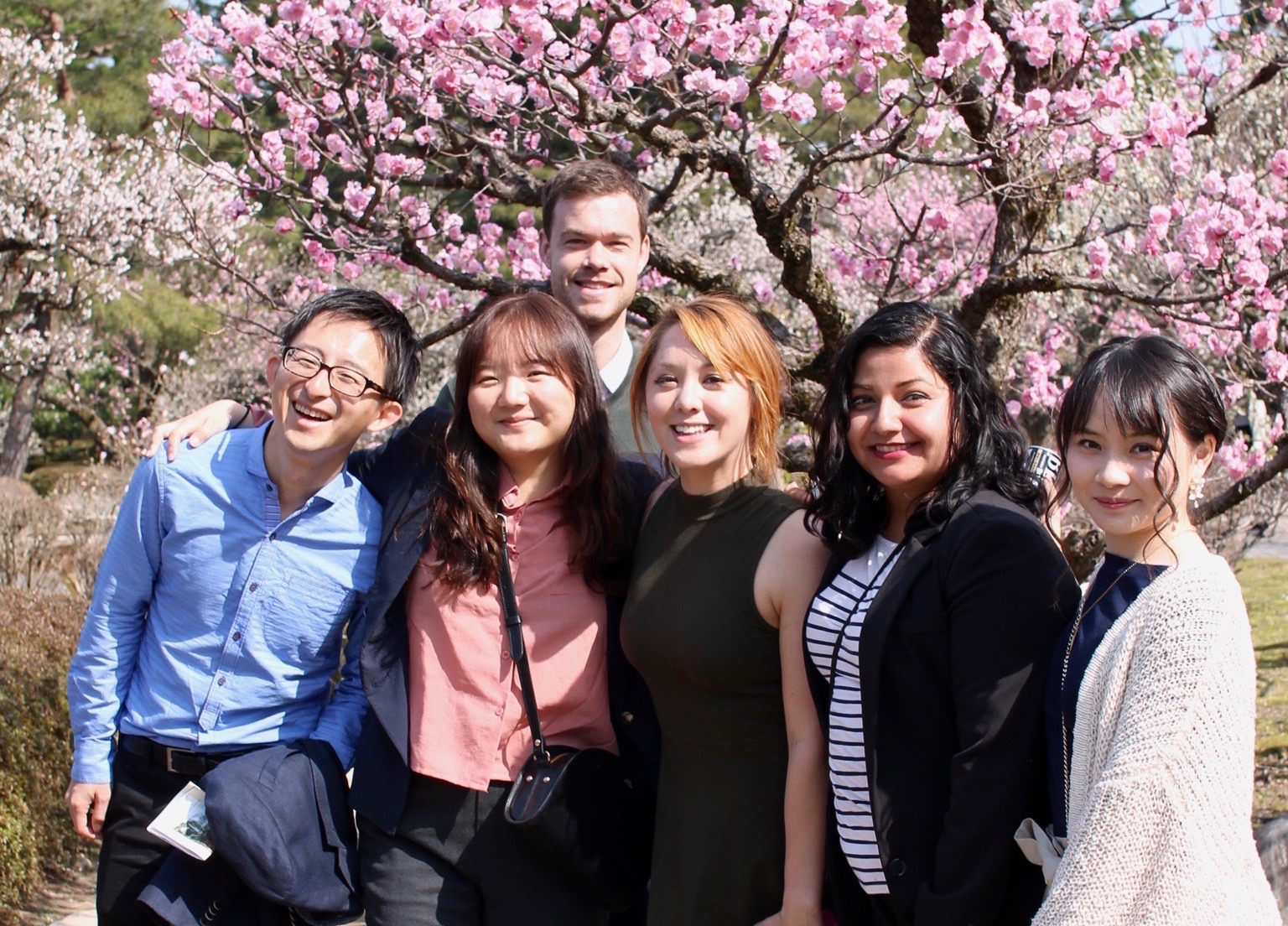
Sabrina Kim, second from left, helped organize the 2018 student trip to Japan. Photo by Tessa McFarland
Her Luskin Family
Being away from her family — especially her sister — has been difficult, but it’s made somewhat easier because of the UCLA Luskin family — her fellow students.
“It was less difficult than I thought it would be because everyone was so welcoming, Kim says. “I was so surprised because in Korea everyone is so competitive. There are only a certain amount of people that can get A’s, B’s, and C’s. So even though you’re classmates, you’re actually competing with each other, so no one shares notes unless you’re really good friends.
“But here everyone is so open to help me out, especially with grammar and writing. Luskin students are open to reviewing what I wrote, sharing lecture notes and answers for the assignments.”
One more nice thing about living here? “There’s also a Koreatown in L.A. so I don’t have any problems with food.”
After she graduates in June, she hopes to find a job in L.A. so her visa can be extended. And she hopes that it will wind up being at SCAG or another nonprofit.
“I worked with a nonprofit organization in Korea before I moved out here and I didn’t think it was a good fit for me,” Kim says. “So I always saw myself going into the private sector. But after coming here and working with SCAG — and being part of different research projects that stem from nonprofit organizations and research institutes — I see myself doing more data analysis for nonprofit organizations.”
Kim is grateful to UCLA Luskin for the chance to work with SCAG and for the other opportunities she’s had over the past two years.
“Luskin School has really changed my life,” she says. “The classes are amazing. The professors are always willing to help you out and talk to you. But I think if I had to choose one thing about this school that I loved most, it’d have to be the people I met: my cohort, my classmates. It’s really cool to be part of a group where everyone’s interests are the same and we all fight for the same thing. We fight for the community, better sustainability and development, a more healthy environment for the future generations.
“The friends I made on campus and in class are the most valuable things I’ve gained here, and Luskin School is the one I should be thanking.”
View more photos of the three students in a Flickr album
